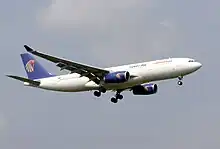aeroplane
English

An aeroplane (Airbus A330)
Alternative forms
Etymology
From French aéroplane, from Ancient Greek ἀερόπλανος (aeróplanos, “wandering in air”), from ἀήρ (aḗr, “air”) + πλάνος (plános, “wandering”). First used by Joseph Pline in an 1855 patent.;
Pronunciation
- (Received Pronunciation) IPA(key): [ˈɛə̯.ɹə.pleɪ̯n], dated IPA(key): [ˈeɪ.əɹ-]
- (Standard Southern British) IPA(key): [ˈɛː.ɹə.plɛjn]
(file) - (MLE) IPA(key): [ˈɛː.ɹow.plejn], [ˈɛː.ɹow.pleːn]
- (General Australian) IPA(key): [ˈɛː.ɹ(ə).plɛɪ̯n]
(file) - (US) IPA(key): /ˈɛɚ.ə.pleɪ̯n/
- Hyphenation: ae‧ro‧plane
Noun
aeroplane (plural aeroplanes)
- (aviation, Commonwealth) Synonym of airplane. A powered heavier-than-air aircraft with fixed wings.
- (aeronautics, archaic, obsolete) Synonym of airfoil. An aerodynamic surface.
- Any of various nymphalid butterflies, of various genera, having a slow gliding flight. Also called planes.
Usage notes
- Aeroplane was the predominant spelling in the US until the 1920s, and is still used idiolectally among some American speakers.
- Canada officially uses aeroplane, but the spelling airplane has become much more common as a result of US influence.
- Airplane has also become a usual variant in most other areas, but is considered informal.
Derived terms
Related terms
airfoil
airplane
aviation, aeronautics
Translations
airplane — see airplane
Verb
aeroplane (third-person singular simple present aeroplanes, present participle aeroplaning, simple past and past participle aeroplaned)
- (intransitive) To fly in an aeroplane.
- (transitive) To transport by aeroplane.
- 1919, The American Angler, volume 4, page 221:
- The rod was discarded, and then, hand over hand, the prize of them all was aeroplaned to the top of the cliff.
See also
This article is issued from Wiktionary. The text is licensed under Creative Commons - Attribution - Sharealike. Additional terms may apply for the media files.